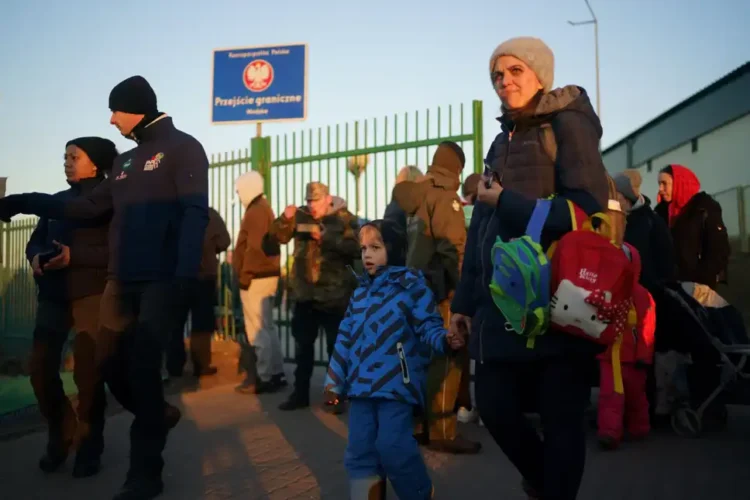By Ben Kerrigan-
Refugee charities have decried the UK government to scrap visa requirements for Ukrainian refugees, amid mounting anger about the government’s slow progress in issuing paperwork to people fleeing a war zone.
Applicants to host Ukrainian refugees under the Homes for Ukraine scheme have revealed that some refugees are being forced to remain in the conflict zone while UK visas are processed.
Home office figures today revealed that the UK has granted only 2,700 visas under its much advertised Homes for Ukraine sponsorship scheme more than two weeks after its launch.
The department also released updated figures about the number of people who have been granted visas to come to stay with British relatives. The Ukraine Family scheme, which has been running since the start of March, has issued 22,800 visas
The UK government earlier this month, urged the British public to accommodate Ukranian refugees, offering families £350 a month to do so.
Prime Minister Boris Johnson had presented the UK as helping lead the global response to the Russian invasion – which Moscow calls a “special operation” – but his government has faced criticism for delays in accepting refugees.
Legislators from all the main political parties have roundly criticized the government’s insistence that Ukrainians seek visas and biometric tests before arriving in the UK, saying this prioritized bureaucracy over the welfare of those fleeing war.
Under the new scheme, members of the public, charities, businesses and community groups should be able to offer accommodation via a web page by the end of next week, the government said.
Over 4m refugees have left Ukraine in the past month, according to the United Nations high commissioner for refugees, and the British Home Office has granted 21,600 visas to Ukrainians who are hoping to join relatives in Britain under the Ukraine Family scheme.
Several disgruntled applicants have complained to the UK Guardian that there is no way to track applications, leaving refugees uncertain about whether to begin travelling to the UK, or to remain in Ukraine. Others have complained about the poor design of forms, which they say contains glitches, and is difficult to complete if English is not your first language.
A representative of The Guardian told The Eye Of Media.Com that it was keeping track of the situation regarding visas to Ukraine refugees.
The Guardian revealed that other applicants have struggled with the amount of documentation needed, questioning whether it is realistic for people fleeing war zones to have brought bank statements, or other documentary evidence proving they were resident in Ukraine.
A Conservative councillor resigned from the party at the weekend after being shocked at the red tape surrounding the UK’s Ukraine visa system, which she said reflected the government’s “hostile” and “xenophobic” approach to refugees.
Lauren Scott, director of hosting charity Refugees at Home, said: “We have been told anecdotally that the delay is largely down to the onerous visa application process, which is frustrating for our hosts and must be soul-destroying for guests. It is creating a huge bottleneck. So far we only know of three sponsorship visas granted to potential guests, and that’s all to one family.”
An opinion poll released on Sunday by Savanta ComRes indicated that 54% of people in the UK support a no-visa policy, and would like to allow an unlimited number of Ukrainians who are fleeing the Russian invasion to come to the UK.
Despite concerns over the slowness of the process for granting visas to Ukrainian refugees, organisations working to resettle Afghan refugees who were airlifted from Kabul last August have asked the Homes for Ukraine scheme to be extended to allow households also to host Afghan families.
In a letter to Michael Gove, secretary of state for levelling up, 50 signatories – including the head of the Refugee Council and former Conservative ministers Robert Buckland, Damian Green, Johnny Mercer and Caroline Nokes – called on the government to permit some of the 12,000 Afghans who are still being accommodated in hotels to be hosted in residential homes.




